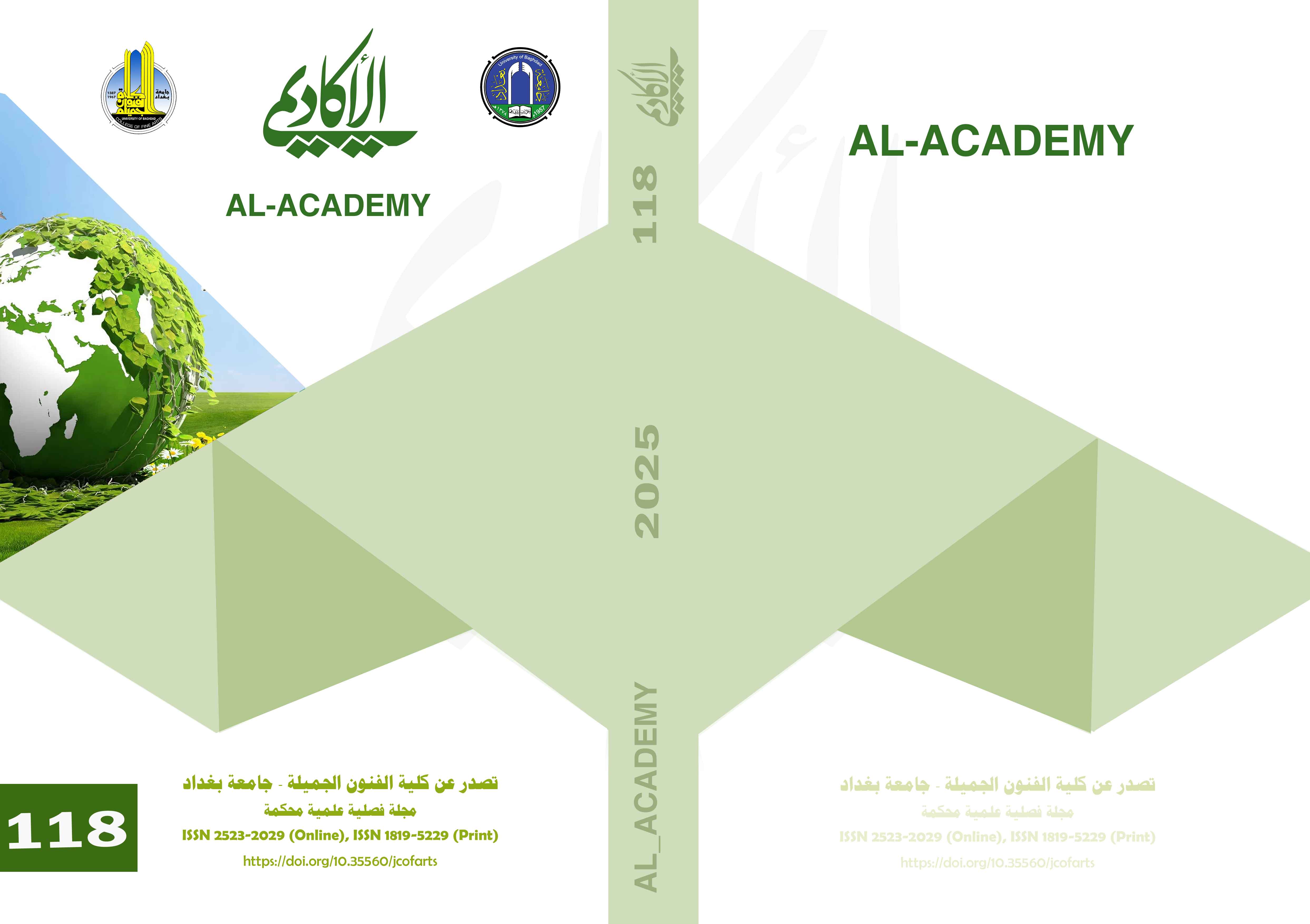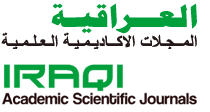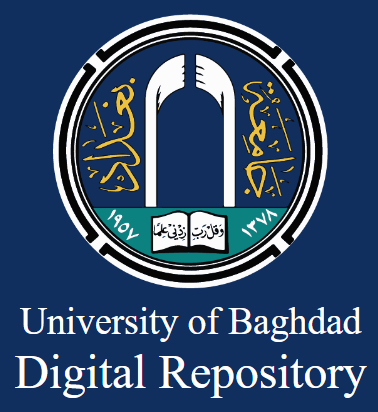The impact of cognitive stimulants on the development of educational experiences At the students of art education
DOI:
https://doi.org/10.35560/jcofarts1568Keywords:
cognitive enhancers, educational experiencesAbstract
The current research aims to identify the impact of cognitive stimulants in developing the educational experiences of art education students in the subject of teaching methods.
Through:
- Designing educational plans according to cognitive stimuli to develop the educational experiences of art education students in the subject of teaching methods.
- Designing a test to develop educational experiences in the subject of teaching methods.
- Measuring the impact of cognitive stimulants in the development of educational experiences among students of art education in the subject of teaching methods.
The research community was identified, which was represented by members of the third grade in the Department of Art Education/ Faculty of Fine Arts, which consists of (6) academic divisions in which the number of students reached (114) male and female students by (59) male and (55) female students.
The research sample was determined by the random method represented by the two divisions (C-D). The number of students was (38) male and female students, as the division (C) was selected as an experimental group in which the teaching of plans prepared according to cognitive stimulants is applied. Division (D) as a control group learns the subject of teaching methods in the usual way.
A test was built to develop educational experiences in the subject of teaching methods, as it included (20) test items of multiple choice.
The psychometric properties of the test (validity and stability) were confirmed, and then the t-test was used for two independent samples.
The researchers found that the members of the experimental group who studied according to the strategies of cognitive stimulants were superior to the members of the control group who studied according to the traditional method.
The researchers found the following results:
- The use of cognitive stimulants has a much better impact than the usual method of teaching the subject of teaching methods in terms of developing the educational experiences of art education students.
- The use of cognitive stimulants has contributed to raising students' motivation and attracting their attention to the subject.
- It has contributed to changing the role of the teacher, as it is no longer just a prompt for the learner, but rather teaching students how to organize, process, store and recall information when needed.
In light of the results of the research, the two researchers recommend what comes next.
- Teaching cognitive stimulants within the course of teaching different subjects.
- Training the students of the Department of Art Education on how to use, employ and practice cognitive stimulants during application in the fourth grade.
- Paying attention to the basic thinking and its various skills because it has a role in developing the educational experiences of art education students.
- Using cognitive stimulants in teaching the art education teaching methods course.
In light of the results of the research, the researchers recommend the following.
- An educational program based on the use of cognitive stimulants in the development of art education students' attitudes towards a subject.
References
Ibrahim, Abdul Latif Fouad 1982 (M) Curriculum founded, organized and evaluated its impact, Egyptian Renaissance Library, Cairo.
Tamam, Shadia Abdel Halim, and Salah Ahmed Fouad Salah, (1918), Al-Shamil in Curricula and Modern Teaching and Learning Methods.
Jaber, Jaber Abdul Hamid(1999AD), Teaching and Learning Strategies, Dar Al-Fikr Al-Arabi for Publishing and Distribution, Cairo.
Jarwan Fathi (1999), Teaching Thinking - Concepts and Applications, Dar Al-Kitab Al-Jami.
Habib, Kanaan Ghadban (2013) The impact of educational complexes and learning teams in the development of inferential thinking among students of the Department of Art Education in the subject of the history of modern art, Academic Journal, University of Baghdad, Issue (66).
Hassan, Raad Aziz Abdullah (2013) The Effectiveness of Constructivism in Education by Achieving Students of the Department of Art Education, Al-Academy Journal, University of Baghdad, Issue (66).
Darwazah, Afnan Nazir(1995AD), Perception Strategies and their stimulants as a basis for the values of education,1st Edition, Al-Najah University, Nablus.
Darwaza, Afnan Nazir(2007AD), Theory in Teaching and its Scientific Translation, Dar Al-Shorouk Publishing and Distribution, Amman.
Darwaza, Afnan Nazir. Fundamentals in Educational Psychology (Cognitive Strategies and Doping as a Basis for Educational Design) Studies, Research and Applications, Dar Al-Shorouk Publishing and Distribution, 2004.
Al-Sayed, Mahmoud Ahmed(2010AD) in Methods of Teaching Arabic Language, Damascus University Publications, Damascus, Syria.
Shehata, Hassan, and Zainab Al-Najjar(2007AD) Modern Teaching and Learning Strategies and the Making of the Arab Mind, Egyptian House, Cairo.
Sandakli, Amer. (2009) Scientific Research and the Use of Traditional and Electronic Information Sources, Al-Yazouri Scientific House for Publishing and Distribution, Amman.
Attia Mohsen Ali(2009AD). Organizing the Learning Environment, Dar Al Safa Publishing and Distribution, Amman.
Attia, Mohsen Ali(2008AD). Modern Strategies in Effective Teaching, Dar Al-Safa Publishing and Distribution, Amman, Jordan.
Al-Afoun, Nadia Hussein, and Qahtan Fadl Rahi(2010AD). Learning and their relationship to practical thinking and environmental awareness, Safaa Publishing and Distribution House, Amman.
Ali, Karim Hawass and Osama Hassan Abdul Ali (2017AD). The shape of the circular house as an effective strategy in the achievement of art education students, Academic Journal, University of Baghdad, Issue (84).
Al-Fatlawi, Jawather Hamza Kazem Attia Ibrahim Awaid Harat (2014) The effect of reading comprehension among students of the second intermediate grade in the subject of reading. Journal of the Faculty of Basic Education for Educational and Human Sciences, University of Babylon, Issue (17).
Laffeta, Mohammed Saadi (2013) Training of Education Teachers Using the Micro-education Strategy, Al-Academy Journal, University of Baghdad, Issue (66).
Mahmoud, Muhammad Anwar, (2015AD). Problems in the Preparation of Educational and Psychological Research, Journal of the Faculty of Basic Education for Educational and Human Sciences, University of Babylon, Issue (20).
Curtis, r.v, Riegeluth, c.m. (1984) The use of analogies in written text. Instructional science.
Medlwey, Detcher, (1999) Effectiveness in Harold Emetzil. Encyclopededia of Edacational Research, method.














